Spiders of Saskatchewan
Of the 39 species found in our database, the following are established in Saskatchewan. Our current understanding of each spider’s distribution is drawn from numerous scientific publications and online spider submissions in order to be as accurate as possible. It is important to remember that spiders are not bound by the territorial lines decided on by humans; therefore their distribution is subject to change. Occasionally, spiders can be found well outside of their known range due to being intentionally or accidentally transported by humans in cars, luggage, and other belongings.
Species Found in Saskatchewan
Agelenopsis spp.- (Grass Spider)
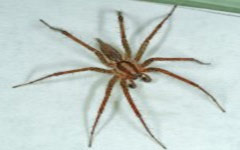
Adult Male
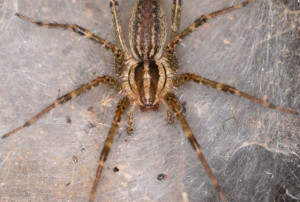
Adult Female
Summary
“Grass Spiders” are represented by 13 species collectively found throughout most of the U.S. and southern Canada, and northern Mexico. Like all members of the funnel weaver family Agelenidae, they spin dense, non-sticky, sheet-like webs with a funnel-like retreat where the spider hides.
Argiope trifasciata – (Banded Garden Spider)
Adult male
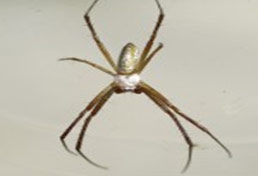
Adult Female
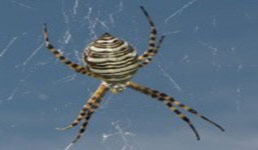
Summary
Females are large, silvery spiders with legs banded in black and yellow. Look for this species in late summer and fall in fields, prairies, gardens, and meadows. The circular webs are built close to the ground amid tall grasses and weeds, often with a zigzag band of silk running through the center.
Castianeira longipalpa (Ant Mimic Spider)
Adult male
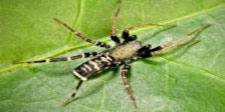
Adult Female
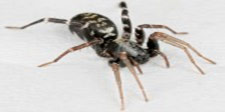
Summary
This strikingly patterned species is a wandering hunter, often catching prey at night as well as during the day. They live close to the ground, under rocks and logs or in leaf litter, but are also occasionally found on (or in) buildings. Their movements are often ant-like, earning them the nickname “antmimic.”
Cheiracanthium mildei (Longlegged Sac Spider)
Adult male
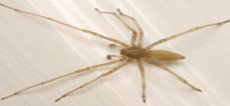
Adult Female
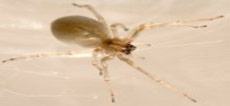
Summary
“Longlegged Sac Spiders” are pale green, tan, or yellow nocturnal hunting spiders with very long front legs. Native to southern Europe, this spider has made its way into North America, where it is now fairly widespread. It is commonly found indoors, where it prowls walls and ceilings at night, looking for prey or mates.
Dolomedes triton (Six-spotted Fishing Spider)
Adult male
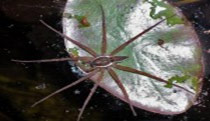
Adult Female
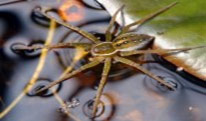
Summary
A large and strong hunting spider, this species is more closely associated with water than any of the other Nearctic fishing spiders. Find it among aquatic vegetation at the margins of streams and rivers, as well as floating around in lakes and residential pools. It eats aquatic insects, small fish, or even small amphibians!
Eratigena atrica (Giant House Spider)
Adult male
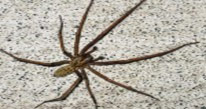
Adult Female
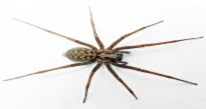
Summary
The leg span of this large funnel weaver can reach 4 inches or more! Native to Europe, the “Giant House Spider” is now well-established in the Pacific Northwest. The webs can be found in dark corners of rooms, garages, sheds, under rocks and logs, etc. May be mistaken for a Hobo Spider on occasion.
Herpyllus ecclesiasticus (Eastern Parson Spider)
Adult male
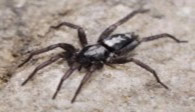
Adult Female
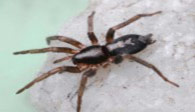
Summary
This a hunting spider that does not spin a web to capture prey. It gets its common name from the black and white color pattern reminiscent of the garb worn by old-time clergymen. Common east of the Rocky Mountains, it sometimes strays indoors in the course of prowling for a meal or seeking a mate.
Misumena vatia (Goldenrod Crab Spider)
Adult male
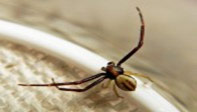
Adult Female
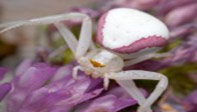
Summary
This spider is an ambush hunter, lying patiently in wait on flowers for an insect to come within striking range. Adult females may be overall yellow or white, with the ability to change back and forth. This species can conquer surprisingly large prey like bees and butterflies.
Parasteatoda tepidariorum (Common House Spider)
Adult male
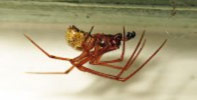
Adult Female
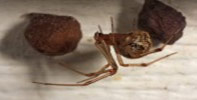
Summary
This species is abundant and widespread across the entire world, and is closely associated with buildings and other man-made structures. The teardrop-shaped, papery brown egg sacs can aid in their identification. The spider’s color and body shape cause them to be mistaken for “brown widows” on occasion.
Phidippus audax (Bold Jumper)
Adult male
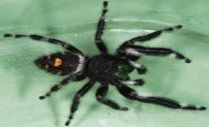
Adult Female
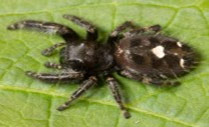
Summary
The “Bold Jumper” is one of the largest and most common species of jumping spider in North America. The spider is mostly black with a conspicuous white, orange, or red triangular patch in the center of its abdomen. Take a close look at this spider’s chelicerae (jaws), as they have a gorgeous, iridescent sheen to them and come in a variety of colors!
Pholcus phalangioides (Longbodied Cellar Spider)
Adult male
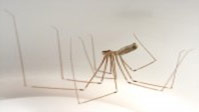
Adult Female
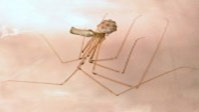
Summary
The Longbodied Cellar Spider is thought to be native to Europe, but can be found globally after having traveled nearly everywhere as a stowaway in commerce. Their long, thin legs and elongated abdomen make them relatively easy to identify. Find them on ceilings, in basements, storage sheds, old wells, caves, and other dry locations with low light.
Salticus scenicus (Zebra Jumper)
Adult male
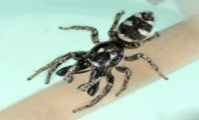
Adult Female
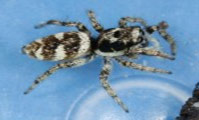
Summary
The zebra-like color pattern makes this species one of the easier jumping spiders to identify in the field. It is most common around urban and suburban areas where it hunts by day on fences, rock walls, the exterior of buildings, and similar situations. Thought to be native to Europe, it is also now established in the U.S., southern Canada, and Asia.
Tegenaria domestica (Barn Funnel Weaver)
Adult male
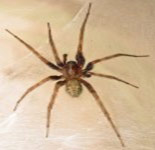
Adult Female
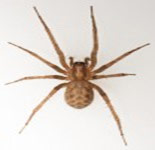
Summary
Today, this species occurs nearly everywhere people live, having spread with international commerce. The sheet-like webs of this spider are conspicuous in dark corners of barns, cellars, sheds, garages, cabins, and other man-made structures. Adult males frequently get caught in bathtubs or sinks at night.

